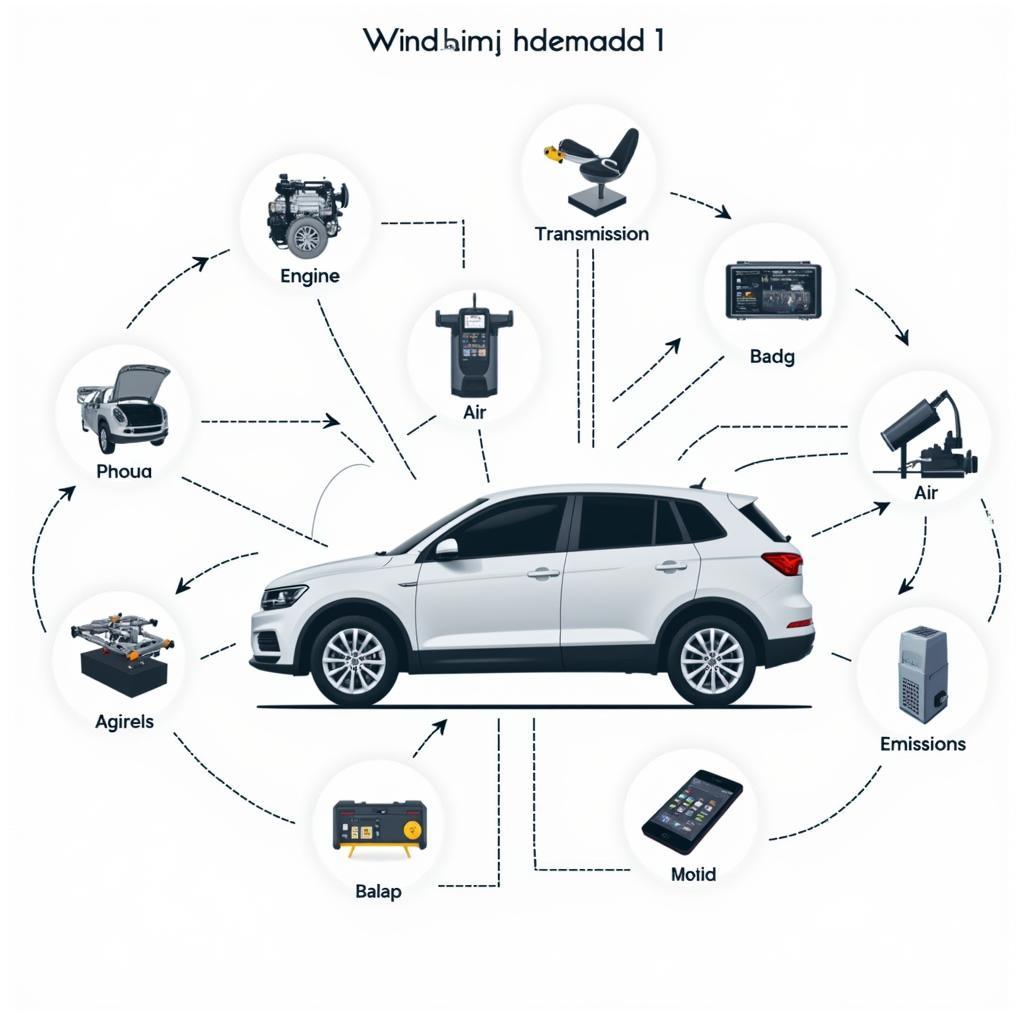A Full Car Diagnostic Test, also known as a comprehensive car diagnostic test, is a thorough examination of your vehicle’s electronic systems using advanced diagnostic equipment. It’s much more than just checking your engine light! This in-depth scan allows mechanics to access your car’s computer system, retrieving valuable data about its health and performance.
What Does a Full Car Diagnostic Test Check?
 Full Car Diagnostic Test Components
Full Car Diagnostic Test Components
A full car diagnostic test goes beyond the basics, delving into various systems to identify existing and potential issues:
- Engine and Transmission: This includes checking for misfires, fuel/air mixture problems, and transmission faults.
- Brakes: The test assesses the Anti-lock Braking System (ABS), Electronic Brake-force Distribution (EBD), and other brake components.
- Airbags and Safety Restraints: The system is checked for any faults that may hinder its deployment during an accident.
- Emissions System: This includes monitoring the catalytic converter, oxygen sensors, and evaporative emissions system.
- Other Electronic Systems: The test can also identify issues with the power steering, air conditioning, lighting, and other electronic modules.
When Should You Get a Full Car Diagnostic Test?
While regular maintenance is essential, certain situations call for a full car diagnostic test:
- Illuminated Warning Lights: Any illuminated warning lights on your dashboard, such as the check engine light, ABS light, or airbag light, necessitate a diagnostic check.
- Performance Issues: If you experience unusual noises, reduced fuel efficiency, difficulty starting, rough idling, stalling, or strange smells, a diagnostic test can pinpoint the cause.
- Pre-Purchase Inspection: Before purchasing a used car, a full diagnostic test is crucial to uncover hidden problems and avoid potential future expenses.
- Regular Check-up: Consider a full car diagnostic test annually or bi-annually, even without apparent issues, to ensure optimal vehicle performance and catch problems early on.
Benefits of a Full Car Diagnostic Test
- Early Problem Detection: The test can detect issues before they escalate into major repairs, saving you time and money.
- Accurate Diagnosis: It provides precise information about your car’s condition, allowing mechanics to address problems efficiently.
- Increased Safety: Identifying and fixing issues related to brakes, airbags, and other safety systems ensures a safer driving experience.
- Improved Fuel Efficiency: Addressing engine and emissions problems can optimize fuel consumption and save money on gas.
- Enhanced Resale Value: A well-maintained car with a clean diagnostic report holds a higher resale value.
Full Car Diagnostic Test Cost
The cost of a full car diagnostic test can vary based on several factors:
- Location: Prices may differ depending on your geographical location and the local market rates.
- Service Provider: Dealerships often charge more than independent mechanics or specialized car diagnostic centers.
- Vehicle Make and Model: The complexity of the car’s electronic systems can influence the time and effort required for diagnosis.
- Additional Repairs: The cost will increase if the diagnostic test reveals issues requiring immediate repairs.
To get an idea of the average cost in your area, you can search online for “full diagnostic test on car cost” or “full diagnostic test on car near me.”
Choosing a Reliable Diagnostic Service
When selecting a service provider for your car’s full diagnostic test, consider the following:
- Experience and Expertise: Look for mechanics or centers specializing in car diagnostics with a proven track record.
- Equipment and Technology: Ensure they use up-to-date diagnostic equipment compatible with your car’s make and model.
- Customer Reviews and Reputation: Check online reviews and ratings to gauge their reliability and customer satisfaction.
- Transparency and Communication: Choose a provider who clearly explains the test results and recommended repairs.
A full car diagnostic test is an invaluable tool for maintaining your vehicle’s health, performance, and safety. It offers a comprehensive understanding of your car’s condition, allowing you to address problems proactively and avoid costly repairs down the road. Remember to choose a reliable and trustworthy service provider to ensure accurate diagnosis and effective solutions. You can find more information about diagnostic tools and reviews on eBay Klavkarr car diagnostics.
FAQ
1. How long does a full car diagnostic test take?
A full car diagnostic test usually takes between 30 minutes to an hour, depending on the complexity of the vehicle’s systems and the number of issues detected.
2. Can I perform a full car diagnostic test myself?
While basic OBD-II code readers are available for personal use, a full car diagnostic test requires specialized equipment and expertise best left to qualified mechanics.
3. Will a full car diagnostic test drain my car battery?
No, a full car diagnostic test uses minimal battery power and should not drain your car battery.
4. Does a full car diagnostic test void my car warranty?
No, getting a full car diagnostic test will not void your car warranty. In fact, regular maintenance and problem detection can help you maintain your warranty coverage.
5. What happens after a full car diagnostic test?
After the test, the mechanic will discuss the findings with you, explaining any error codes or issues detected. They will then recommend necessary repairs or further inspections.
Do you have additional questions about car diagnostics or need help finding a trustworthy mechanic near you? Feel free to explore more articles on our website, such as full diagnostic car test and full diagnostic test on car.
Need immediate assistance? Contact our 24/7 support team via WhatsApp: +1(641)206-8880, or Email: [email protected]. We’re here to help!

Leave a Reply